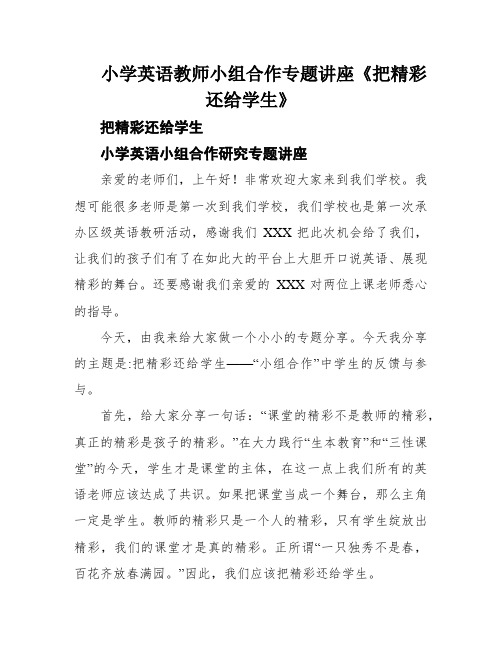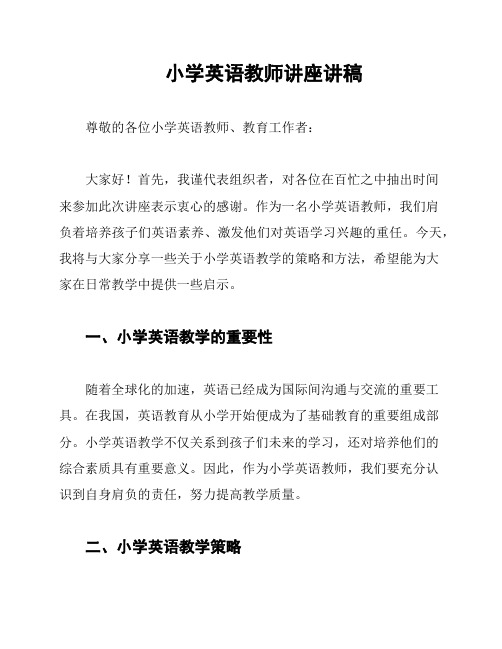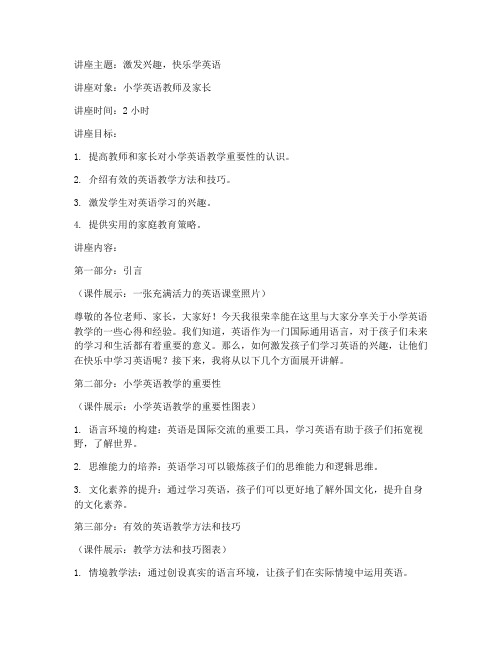小学英语专题讲座稿
小学英语教师小组合作专题讲座《把精彩还给学生》

小学英语教师小组合作专题讲座《把精彩还给学生》把精彩还给学生小学英语小组合作研究专题讲座亲爱的老师们,上午好!非常欢迎大家来到我们学校。
我想可能很多老师是第一次到我们学校,我们学校也是第一次承办区级英语教研活动,感谢我们XXX把此次机会给了我们,让我们的孩子们有了在如此大的平台上大胆开口说英语、展现精彩的舞台。
还要感谢我们亲爱的XXX对两位上课老师悉心的指导。
今天,由我来给大家做一个小小的专题分享。
今天我分享的主题是:把精彩还给学生——“小组合作”中学生的反馈与参与。
首先,给大家分享一句话:“课堂的精彩不是教师的精彩,真正的精彩是孩子的精彩。
”在大力践行“生本教育”和“三性课堂”的今天,学生才是课堂的主体,在这一点上我们所有的英语老师应该达成了共识。
如果把课堂当成一个舞台,那么主角一定是学生。
教师的精彩只是一个人的精彩,只有学生绽放出精彩,我们的课堂才是真的精彩。
正所谓“一只独秀不是春,百花齐放春满园。
”因此,我们应该把精彩还给学生。
接下来,请大家做一个选择:作为教师的你,是愿意做“纤夫”还是“牧者”呢?“纤夫”是把学生看成需要拉动的逆水之舟,而“牧者”:则是把羊群(学生)带到水草丰盈之处,让它们自由地吃草,这意味着又管理着羊群,又尊重着羊群独立的生命活动。
答案毋庸置疑,我们当然选择当“牧者”。
那么大家肯定会有一个疑问:怎样当一名智慧的牧者,把精彩还给学生呢?下面我将联合“三性课堂”中的“四学”——首学、互学、群学、共学及我们学校英语组老师们这一年多以来开展“研究生本教育,构建生态课堂,推进“三性教育”大实践活动中所做的尝试和总结出的不太成熟的经验给大家做分享。
一、精心设计,“首学”更充分。
首学”是学生为围绕研究任务进行预与先学的研究阶段。
根据小学英语学科的特点,将首学放在课前能让学生对新课的预更充分,也更能培养和提升学生的自主研究能力。
我不知道现在大家是否还在让学生进行课前预,确实学生如果课前进行了预,上课时就缺乏了“信息差”,但前置研究又是生本课堂的重要表现方式,同时联合我校学生的实际,目前我们仍然在请求学生进行预,并把它视为“首学”。
小学英语讲座讲稿范文

小学英语讲座讲稿范文Good morning, dear students! Today, we embark on a thrilling journey into the world of English, a language that opens doors to cultures, knowledge, and opportunities beyond our imagination. Imagine being able to communicate with friends from around the globe, or understanding the stories and ideas that have shaped the world. That's the power of English!As we delve into the basics of English, let's remember that every language starts with the ABCs. But it's not just about memorizing letters; it's about understanding how they come together to form words that paint pictures in our minds. From simple greetings like "Hello" and "Goodbye" to more complex sentences, each word is a building block in constructing meaningful conversations.But language is more than just words; it's about expression. It's about conveying emotions, sharing experiences, and telling stories. English, with its rich vocabulary and flexible grammar, offers endless ways to express yourself. Whether you're describing the beauty of a sunset or the excitement of a sports match, the right words can make all the difference.Let's also not forget the importance of listening. Being a good listener is as crucial as being a good speaker. It's through listening that we learn, understand differentperspectives, and show respect for others' ideas. So, as we practice our English, let's also practice being attentive listeners.Reading is another key component of mastering English.It's not just about decoding words on a page; it's about immersing yourself in different worlds, learning new ideas, and expanding your horizons. From classic literature to contemporary magazines, the more you read, the more you'll grow as an English speaker.And finally, let's talk about writing. Writing is a powerful tool for self-expression and communication. Itallows you to put your thoughts on paper, to create stories, and to share your unique point of view with the world.Whether it's a simple diary entry or a more formal essay, writing in English can be both a creative outlet and a meansof communication.In conclusion, learning English is an adventure filledwith discovery and growth. It's about more than just language; it's about connecting with the world. So, let's embrace this journey with curiosity, enthusiasm, and an open mind. Remember, every word you learn brings you one step closer to fluency and to a world of endless possibilities. Happy learning, and may your English be as colorful and vibrant as the world it can introduce you to!。
小学英语教师讲座讲稿

小学英语教师讲座讲稿尊敬的各位小学英语教师、教育工作者:大家好!首先,我谨代表组织者,对各位在百忙之中抽出时间来参加此次讲座表示衷心的感谢。
作为一名小学英语教师,我们肩负着培养孩子们英语素养、激发他们对英语学习兴趣的重任。
今天,我将与大家分享一些关于小学英语教学的策略和方法,希望能为大家在日常教学中提供一些启示。
一、小学英语教学的重要性随着全球化的加速,英语已经成为国际间沟通与交流的重要工具。
在我国,英语教育从小学开始便成为了基础教育的重要组成部分。
小学英语教学不仅关系到孩子们未来的学习,还对培养他们的综合素质具有重要意义。
因此,作为小学英语教师,我们要充分认识到自身肩负的责任,努力提高教学质量。
二、小学英语教学策略1. 激发学习兴趣兴趣是最好的老师。
我们要善于运用各种教学手段,如图片、实物、游戏等,让英语学习变得生动有趣,从而激发学生们的学习兴趣。
2. 注重语音教学语音是英语学习的基础,我们要重视语音教学,让学生掌握正确的发音方法,为今后的英语学习打下坚实基础。
3. 情景教学创设真实的语境,让学生在情景中自然地学习和使用英语。
例如,通过角色扮演、故事讲解等方式,让学生在实际情境中锻炼英语表达能力。
4. 差异化教学考虑到学生之间的个体差异,我们要因材施教,针对不同程度的学生制定合适的教学计划,使每个学生都能在原有基础上得到提高。
5. 鼓励合作学习鼓励学生之间进行合作学习,通过讨论、互动等形式,提高他们的团队协作能力和沟通能力。
三、教师素养提升作为一名优秀的小学英语教师,我们不仅要具备扎实的英语专业知识,还要不断提高自己的教育教学能力。
具体措施包括:1. 深入学习英语教学理论,掌握教育教学方法。
2. 参加各类教育培训,提高自己的业务水平。
3. 关注教育领域的发展动态,不断更新教育观念。
最后,希望大家能够将本次讲座的内容运用到日常教学中,努力提高小学英语教学质量,为培养具有国际竞争力的优秀人才贡献力量。
小学英语讲座交流发言稿

大家好!今天,我很荣幸能在这里与大家分享一些关于小学英语学习的心得体会。
英语作为一门国际通用语言,在我们的生活中扮演着越来越重要的角色。
今天,我想从以下几个方面来和大家交流一下小学英语学习的经验。
一、激发学习兴趣兴趣是最好的老师。
在学习英语的过程中,我们要努力激发自己对英语的兴趣。
以下是一些建议:1. 创设良好的学习氛围。
在家中,可以播放英语歌曲、观看英语动画片,让英语成为生活的一部分。
2. 参加英语角、英语俱乐部等活动,与同学们一起练习英语,提高口语表达能力。
3. 阅读英语绘本、故事书,提高阅读兴趣,拓宽词汇量。
二、培养良好的学习习惯1. 制定学习计划。
每天安排一定的时间学习英语,如背诵单词、阅读英语文章等。
2. 坚持练习听力。
可以通过收听英语广播、观看英语电影等方式,提高听力水平。
3. 多进行口语练习。
与同学、老师进行英语对话,提高口语表达能力。
4. 及时复习。
学习新知识后,要及时复习巩固,避免遗忘。
三、掌握学习方法1. 分类记忆单词。
将单词按照词性、词义进行分类,有助于提高记忆效果。
2. 学会语法。
掌握基本的语法知识,有助于提高写作和口语表达能力。
3. 利用网络资源。
通过在线课程、英语学习APP等途径,丰富学习内容,提高学习效果。
4. 重视阅读。
通过阅读英语文章,提高词汇量、阅读速度和理解能力。
四、注重实践1. 参加英语演讲、写作比赛等活动,提高英语实际运用能力。
2. 积极参加英语角、英语俱乐部等,锻炼口语表达能力。
3. 主动与外国朋友交流,提高英语沟通能力。
总结:学习英语是一个长期的过程,需要我们不断努力。
希望大家在小学英语学习的道路上,保持热情,勇于实践,不断提高自己的英语水平。
最后,祝愿大家在英语学习的道路上越走越远,收获满满!谢谢大家!。
小学英语复习备考专题讲座

小学英语复习备考专题讲座
介绍
本次讲座旨在为小学生复备考英语提供指导和建议,内容涵盖研究策略、知识点梳理和备考技巧。
研究策略
- 日积月累:英语研究不能一蹴而就,需要长期积累。
建议同学们每天坚持看英语书籍、电影、听英语音乐等
- 科学记忆:掌握词汇量是英语研究的基础,建议同学们通过词汇卡片、临摹文章等方式记忆单词
- 刻意练:在研究语法、句型等知识点时,可结合练册、模拟试题等方式多做练,加深理解和记忆
知识点梳理
本次讲座将对小学英语常见的知识点进行梳理和总结,包括但不限于:
- 时态:一般现在时、一般过去时、一般将来时等
- 词汇:基础词汇、常见动词短语、常用句型等
- 阅读:词汇题、推理题、作者观点等
备考技巧
- 积极备考:及早规划备考时间,制定备考计划,进行科学规划和时间安排
- 多练英语听说:口语是英语考试中重要的考察部分,因此需要多练口语表达和听力理解
- 善于策略:考试时需善于使用排除法、寻找关键词等策略,提高答题正确率
希望本次讲座对同学们英语学习和备考有所帮助。
小学英语讲座稿和课件

讲座主题:激发兴趣,快乐学英语讲座对象:小学英语教师及家长讲座时间:2小时讲座目标:1. 提高教师和家长对小学英语教学重要性的认识。
2. 介绍有效的英语教学方法和技巧。
3. 激发学生对英语学习的兴趣。
4. 提供实用的家庭教育策略。
讲座内容:第一部分:引言(课件展示:一张充满活力的英语课堂照片)尊敬的各位老师、家长,大家好!今天我很荣幸能在这里与大家分享关于小学英语教学的一些心得和经验。
我们知道,英语作为一门国际通用语言,对于孩子们未来的学习和生活都有着重要的意义。
那么,如何激发孩子们学习英语的兴趣,让他们在快乐中学习英语呢?接下来,我将从以下几个方面展开讲解。
第二部分:小学英语教学的重要性(课件展示:小学英语教学的重要性图表)1. 语言环境的构建:英语是国际交流的重要工具,学习英语有助于孩子们拓宽视野,了解世界。
2. 思维能力的培养:英语学习可以锻炼孩子们的思维能力和逻辑思维。
3. 文化素养的提升:通过学习英语,孩子们可以更好地了解外国文化,提升自身的文化素养。
第三部分:有效的英语教学方法和技巧(课件展示:教学方法和技巧图表)1. 情境教学法:通过创设真实的语言环境,让孩子们在实际情境中运用英语。
2. 游戏教学法:利用游戏激发学生的学习兴趣,提高课堂氛围。
3. 互动式教学:鼓励学生积极参与课堂活动,提高他们的口语表达能力。
4. 多媒体教学:运用多媒体技术,丰富教学内容,提高教学效果。
第四部分:激发学生英语学习兴趣的策略(课件展示:激发学习兴趣的策略图表)1. 故事教学:通过讲述有趣的英语故事,激发学生的学习兴趣。
2. 歌曲教学:利用英语歌曲,让孩子们在轻松愉快的氛围中学习英语。
3. 角色扮演:通过角色扮演,让孩子们在模仿中学习英语。
4. 英语角:组织英语角活动,让孩子们有机会与外教或其他学生交流。
第五部分:家庭教育策略(课件展示:家庭教育策略图表)1. 营造良好的家庭氛围:鼓励家长和孩子一起学习英语,共同进步。
小学英语专家讲座稿范文

小学英语专家讲座稿范文Learning English at the elementary level is a critical foundation for future academic and professional success. As an experienced English language educator, I am honored to share my insights and strategies for effectively teaching English to young students. In this lecture, I will discuss key principles and best practices that can help elementary school teachers foster strong English language skills in their pupils.One of the most important factors in elementary English education is creating a supportive and engaging learning environment. Young students need to feel comfortable taking risks and making mistakes as they develop their language abilities. Teachers should strive to cultivate a classroom atmosphere that is warm, encouraging, and free of excessive pressure or criticism. Providing plenty of opportunities for students to practice speaking, listening, reading, and writing in low-stakes, collaborative activities can go a long way in building their confidence and fluency.Another crucial element is ensuring lessons are age-appropriate andtailored to students' proficiency levels. Elementary school children have very different cognitive, social, and emotional needs compared to older students. Curriculum and instructional methods must be carefully designed to capture their short attention spans, capitalize on their natural curiosity, and scaffold learning in a step-by-step manner. For instance, relying heavily on visual aids, hands-on manipulatives, songs, and games can make language instruction more accessible and enjoyable for young learners.In addition, effective elementary English teaching requires a balanced, integrated approach that develops all four core language skills concurrently. It is not enough to solely focus on rote vocabulary memorization or grammar drills. Students need ample practice applying their knowledge in authentic, communicative contexts. Lessons should seamlessly incorporate listening, speaking, reading, and writing activities that reinforce and build upon one another. This holistic methodology helps students make meaningful connections and achieve well-rounded proficiency.Furthermore, elementary English teachers must be adept at fostering active student engagement. Passive, lecture-based instruction is generally ineffective for this age group. Instead, lessons should be interactive, dynamic, and centered around student participation. Strategies such as pair work, small group discussions, total physical response techniques, and project-based learning can encouragestudents to actively use the language. When students are actively involved in the learning process, they are more likely to stay motivated and make tangible progress.Equally important is the judicious use of the students' native language, when appropriate. While the target language should be the primary medium of instruction, judiciously incorporating the students' first language can serve as a valuable scaffold. This can involve providing translations, clarifying complex concepts, or checking for comprehension. Used strategically, the students' native language can help minimize frustration and facilitate smoother transitions as they acquire English.Finally, effective assessment and feedback are critical components of quality elementary English instruction. Teachers must employ a balanced approach that includes both formative and summative assessments. Formative assessments, such as informal observations, exit tickets, and learning journals, allow teachers to continuously monitor student progress and adjust lessons accordingly. Summative assessments, like unit tests and performance-based tasks, provide valuable data on students' overall language proficiency. Providing students with clear, constructive feedback on their strengths and areas for improvement is also essential for promoting learning and growth.In conclusion, teaching English effectively at the elementary level requires a multifaceted approach that addresses the unique needs and characteristics of young learners. By creating a supportive learning environment, delivering age-appropriate and skills-integrated lessons, fostering active engagement, judiciously using the students' native language, and implementing well-rounded assessment practices, elementary school teachers can lay a strong foundation for their students' lifelong English language development. Through the implementation of these research-based strategies, we can empower our youngest learners to become confident, competent users of the English language.。
小学英语教师专题讲座发言稿

小学英语教师专题讲座发言稿Ladies and Gentlemen,Today, I am honored to deliver a special lecture on the crucial role of English language teachers in primary schools. As we all know, the foundation of language learning is laid in the early years, and English, as an international language, holds immense importance in today's globalized world.Firstly, let's delve into the significance of English language learning for primary school students. English not only opens up a window to a vast array of knowledge and cultures but also equips students with essential skills for future success. It is through English that children can access the latest scientific advancements, understand diverse perspectives, and engage with the global community. Now, the question arises: how can teachers effectively facilitate this learning process? The answer lies in the pedagogy and teaching techniques employed. As primary school English teachers, we must create an immersive andengaging learning environment that encourages active participation and critical thinking.One effective approach is to use storytelling and role-playing to bring the language to life. By telling captivating stories or engaging in role-plays, students are able to connect with the language in a more meaningful way. This not only enhances their comprehension but also fosters a love for reading and speaking in English.Moreover, the use of multimedia and technology can greatly enhance the teaching-learning process. From interactive whiteboards to educational apps, these tools provide teachers with a plethora of resources to make lessons more engaging and dynamic.However, it is also essential to recognize that every child learns differently. Hence, teachers must employ differentiated teaching strategies to cater to the varying needs and learning styles of their students. This involves understanding each child's strengths and weaknesses, and providing tailored support and challenges accordingly.Furthermore, the role of teachers extends beyond the classroom. They are mentors, counselors, and role modelswho guide students in their personal and emotional growth.It is through their words and actions that students learn values, ethics, and life lessons that shape their character. In conclusion, the role of primary school English teachers is multifaceted and crucial. They are thearchitects of a child's linguistic and cognitive development, shaping their future potential and opening up limitless opportunities. By adopting innovative teaching techniques, utilizing technology, and providingpersonalized support, we can ensure that every child receives a high-quality English education that sets them on the path to success.各位同仁:今天,我很荣幸能够在这里就小学英语教师的重要作用这一主题发表专题讲座。
- 1、下载文档前请自行甄别文档内容的完整性,平台不提供额外的编辑、内容补充、找答案等附加服务。
- 2、"仅部分预览"的文档,不可在线预览部分如存在完整性等问题,可反馈申请退款(可完整预览的文档不适用该条件!)。
- 3、如文档侵犯您的权益,请联系客服反馈,我们会尽快为您处理(人工客服工作时间:9:00-18:30)。
小学英语专题讲座稿
在其理论中提出了“语言得装置”的概念,即人类天生就有一种语言得的机制。
因此,在小学英语教学中,教师应该注重学生的动作得,通过听、做、说、唱、玩、演等方式,让学生在实践中掌握英语语言知识。
同时,教师还应该在教学中注重培养学生的语感和语音、语调基础,让学生在初步掌握英语语言知识的同时,逐渐形成正确的语音和语调。
此外,在小学英语教学中,教师还应该注重学生的兴趣和参与度。
通过设计丰富多彩的教学活动,让学生在轻松愉快的氛围中研究,提高学生的研究兴趣和积极性。
同时,在教学中也要注重学生的实践能力和创造力,让学生在实践中掌握英语知识,培养学生的创造力和表达能力。
总之,小学英语教学应该贴近生活,通过各种教学手段,鼓励学生积极参与,提高学生的研究兴趣和能力。
同时,教师也要注重学生的动作得、语感和语音、语调基础的培养,让学生在实践中掌握英语知识,逐渐形成正确的语音和语调。
最后,
教师在教学中要注重学生的兴趣和参与度,让学生在轻松愉快的氛围中研究,提高学生的实践能力和创造力。
作的动作,同时也锻炼了他们的身体运动智能。
除此之外,我们还可以设计一些英语歌曲和舞蹈,让学生跟着唱跟着跳,这样不仅能够提高他们的英语听说能力,还能够增强他们的协调性和节奏感。
个性化教学,发掘学生的多元智能,提高英语研究效果。
每个学生都有自己独特的智力组合,教师应该根据学生的不同智力强项来实现个性化教学。
比如,对于那些身体运动智能较强的学生,我们可以加强他们的听说训练,让他们通过动作来表达英语单词和句子;对于那些逻辑数学智能较强的学生,我们可以设计一些英语谜语和数学题目相结合的活动,让他们在解决问题的过程中研究英语。
通过这种方式,我们可以发掘学生的多元智能,提高他们的英语研究效果。
综上所述,听做、说唱、玩演等多种活动方式可以有效地促进学生全身心投入英语研究;而个性化教学则可以发掘学生的多元智能,提高英语研究效果。
因此,教师们应该积极探索和实践这些方法,让学生在轻松愉快的氛围中学好英语。
TPR (Total Physical Response) 是一种非常有效的教学方法,它通过身体反应来帮助学生更好地理解和记忆语言知识。
比如,在研究数字 1-10 时,可以拿出篮球,边拍球边用英语数数,
这样既锻炼了身体协调性,又巩固了数字的记忆。
另外,在研究身体部位时,可以进行 Touch 游戏,让老师发出指令,学
生边做动作,边重复身体部位的名称,这样既锻炼了听力,又加深了对身体词汇的记忆。
除了 TPR,角色扮演和戏剧也是非常有趣的教学方式。
通过角色扮演,学生可以更好地理解语言的用法和情境,从而更好地运用语言。
同时,戏剧也可以帮助学生提高语言表达和沟通能力,增强自信心。
